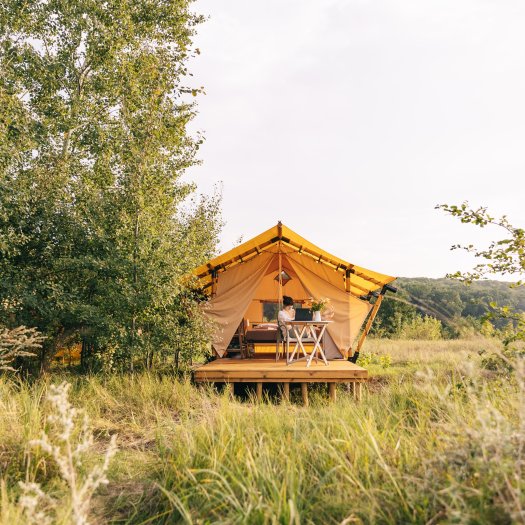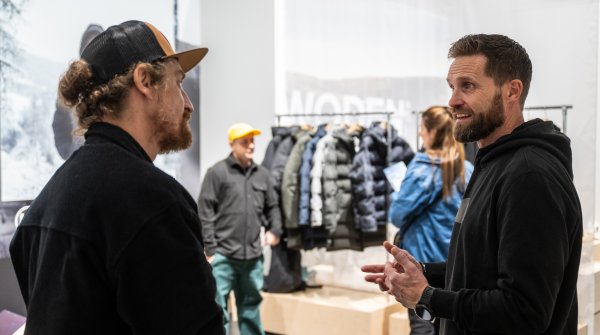In a world where slowing down is becoming a luxury, sustainability is an imperative and digital technologies are ubiquitous, we need to rethink. Today's customers are looking for extraordinary experiences, individual solutions and products that reflect their values. They don't just want to consume, they want to be part of a community and find meaning in what they do.
At the same time, it is important to build genuine relationships with customers and create a strong corporate culture that drives change. Only companies that proactively shape the trends of tomorrow and are brave enough to break new ground will be successful in the long term.
As an industry, we need to reinvent ourselves. We need to be open to change, ready to question the familiar and have the courage to break new ground. Only if we recognize the signs of the times and respond proactively will we be successful in the long term.
The camping market is booming and promises strong growth. Turnover is expected to reach 510 million euros by 2024, rising to 620 million euros by 2029 (CAGR 2024-2029: 3.98%). The number of users will also increase and is expected to reach 4.280 million by 2029.
With an average revenue per user (ARPU) of € 138.30, the willingness of campers to invest in high-quality equipment is evident. Online retail is also gaining in importance and is estimated to account for 48% of total sales in 2029.
The market is also showing impressive momentum. More and more people are discovering camping as an attractive vacation alternative and appreciate being close to nature. The following trends are therefore currently shaping the outdoor vacation and camping market.
Glamping, the luxurious form of camping, is taking the market by storm. More and more people are longing for an outdoor experience that combines comfort and style. They want to enjoy the beauty of nature without having to give up the amenities they are used to. According to a study by KOA Campgrounds, 58% of all campers say that they have already tried glamping. The number of people trying out glamping has therefore increased by 14% between 2021 and 2023. Forecasts indicate that 36% of guests will be interested in trying glamping for the first time in 2024.
Glamping offers range from fully equipped tents to tree houses and luxury yurts. High-end facilities for comfortable camping, such as comfortable air beds, modern sanitary facilities and even private pools are not uncommon. Glamping resorts offer additional services such as gourmet meals, spa treatments and guided activities.
This trend opens up new opportunities for sports retailers. By expanding their product range to include high-quality and stylish camping equipment, they can appeal to the growing target group. Instead of pure functionality, the focus is on design and aesthetics. Therefore, offer complete solutions for outdoor vacations that allow your customers to seamlessly design their glamping experience.
Collaborations with glamping resorts also offer an excellent opportunity to showcase products and attract new customers. Through targeted product placements and co-branding activities, you can strengthen your brand and benefit from your partners' appeal.
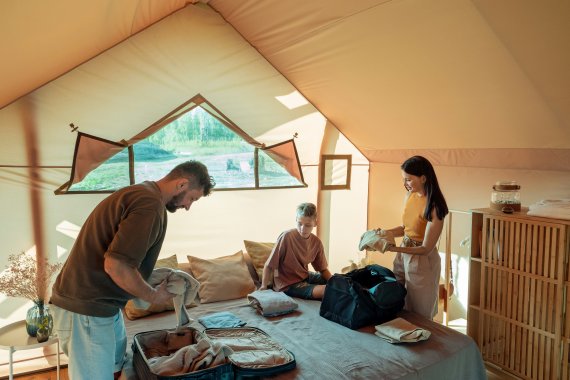
The topic of sustainability is also becoming increasingly important in outdoor tourism and the outdoor industry. A survey found that 59% of travelers consider more sustainable options to be important. Consumers are looking for environmentally friendly alternatives and are willing to pay more for sustainable products. A Booking.com statistic also revealed that the global outdoor equipment market is seeing a huge trend towards sustainable and eco-friendly products. Among other things, people expect companies to make a clear commitment to environmental protection and take concrete measures to reduce their ecological footprint.
For outdoor brands, this means that they need to take a close look at their entire value chain. The use of sustainable materials such as recycled fabrics or biodegradable plastics is becoming a must. Production processes and supply chains also need to pay attention to resource conservation and fair working conditions.
Transparency is the key to success here. Communicate openly about your sustainability efforts and make them tangible for your customers. Also use product labels to highlight environmentally friendly options. You can also share stories about the origins of your products and the people behind them.
By supporting nature conservation projects, you can also underline your commitment and make a positive contribution at the same time. Actively involve your customers, for example through donation campaigns or tree planting campaigns. This creates an emotional connection and strengthens customer loyalty.

Digitalization does not stop at the outdoor industry. Advanced technologies and innovations are changing the way people plan, experience and share their outdoor excursions. Smartphones, GPS devices, Wi-Fi, artificial intelligence and other trip planning tools are becoming indispensable companions for outdoor enthusiasts.
Apps for tour planning, navigation and weather forecasts make preparation easier and increase safety. Wearable devices such as smartwatches and fitness trackers make it possible to track activities and follow your own progress. Smart equipment such as tents with integrated lighting or heated jackets are also becoming increasingly popular.
This also opens up new opportunities for sports retailers. Integrating digital solutions into your product portfolio can create added value for customers. For example, offer GPS devices with pre-installed map data or wearables with special outdoor functions.
Developing your own apps opens up further potential. Whether it's tour planners, equipment checklists for outdoor vacations or product guides for camping - with useful digital tools, you can strengthen customer loyalty and position yourself as an innovative provider. Customer service can also be optimized through digital channels, such as chatbots or video advice.
In times of limited time and travel restrictions, short outdoor vacations in the local area are booming. More and more people are discovering nature on their doorstep and turning a few free hours into a micro-adventure. Whether it's a hike after work, a bike tour at the weekend or a night in a bivouac - local recreation is the trend.
This change in travel behavior offers opportunities for local sports retailers. You can score points with a range that is tailored to the needs of micro-adventurers. Compact and versatile equipment that is easy to transport and quickly ready for use is in demand - so think of ultra-light sleeping bags, foldable bikes or multifunctional jackets.
You can also position yourself as an expert on local recreation in your region. Give insider tips on local camping spots, share GPS data for tours or organize guided micro-adventures. By networking with the local outdoor community, you strengthen your reputation and gain loyal customers.
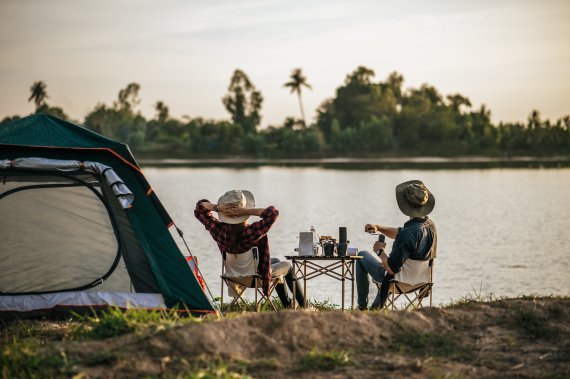
Outdoor activities are increasingly perceived as a means of reducing stress and promoting health. In a hectic world, people seek peace and balance in nature. They use their time outdoors to switch off, take a deep breath and recharge their batteries. Aspects such as mindfulness and slowing down play an important role in this.
This opens up new opportunities for the outdoor industry. Emphasize the positive effects of your products on body and mind. Communicate how your equipment helps to reduce stress, improve work-life balance and increase general well-being.
Expand your range to include items that are specifically geared towards relaxing outdoor activities. Whether it's yoga in nature, forest bathing or meditation by a mountain lake - offer the right equipment and inspire your customers to discover new forms of self-care.
You can also score points with your expertise in health and self-care when advising customers. Train your sales staff accordingly and equip them with specialist knowledge. This will enable you to provide your customers with comprehensive advice, make individual recommendations and offer real added value.
The outdoor vacation and camping industry is undergoing significant change due to trends such as glamping, sustainability and digitalization. Consumers are looking for luxury and comfort in nature, environmentally friendly products and technology-supported experiences. Local micro-adventures and the focus on health and self-care offer new sales opportunities and the possibility of differentiation in the market. It is essential for sports retailers to take advantage of these trends in order to remain innovative and strengthen customer loyalty.
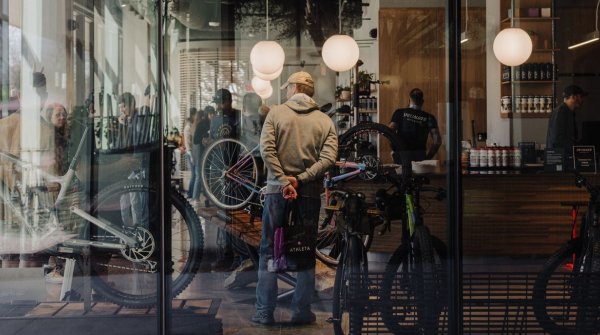 Sports BusinessThe future of the bike industry: 6 innovative bike stores
Sports BusinessThe future of the bike industry: 6 innovative bike stores
- ISPO awards
- Mountain sports
- Bike
- Design
- Retail
- Fitness
- Health
- ISPO Job Market
- ISPO Munich
- ISPO Shanghai
- Running
- Brands
- Sustainability
- Olympia
- OutDoor
- Promotion
- Sports Business
- ISPO Textrends
- Triathlon
- Water sports
- Winter sports
- eSports
- SportsTech
- OutDoor by ISPO
- Heroes
- Transformation
- Sport Fashion
- Urban Culture
- Challenges of a CEO
- Trade fairs
- Sports
- Find the Balance
- Product reviews
- Newsletter Exclusive Area
- Magazine
